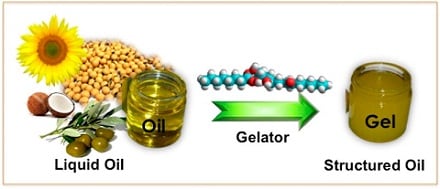The research, published in the Journal of Agricultural and Food Chemistry, reported the successful transformation of four refined vegetable oils to a semisolid structured oil using the low-calorie sugars as a structuring agent.
"We have demonstrated the first sugar-based thickening agents for oil," said Professor George John of City College of New York - who led the study.
John and his colleagues suggested their findings could herald the development of alternatives to structured oil products produced using saturated and trans fatty acids - which have been linked to coronary artery disease, obesity and diabetes.
"In a continual effort to develop functional yet nutritional alternative structuring agents, we report a novel gelator system," they wrote.
"Sugar alcohol-based gelators, namely, mannitol dioctanoate and sorbitol dioctanoate, have been proposed as potential food-grade and healthy structuring agents ... The building blocks of these gelators —sugars and octanoic acid—offer physiological advantages which are favourable for developing foods that will not elevate the risk of metabolic syndromes."
Study details
The team tested two sugar alcohol-based gelators, mannitol dioctanoate (M8) and sorbitol dioctanoate (S8), as structuring agents for four refined vegetable oils purchased at local grocery stores: canola oil, olive oil, soybean oil and grape seed oil.
John noted that both M8 and S8 are amphiphiles (molecules that are attracted to water and fats) consisting of two octanoic acid chains (C8) appended to a sugar alcohol molecule. He added that the two agents also meet both Food & Drug Administration and GRAS (Generally Recognized as Safe) safety specifications, so they can be used for food processing.
The team revealed that both M8 and S8 demonstrated excellent gelation tendencies for all of the oils that were tested - with the gels remaining stable for several months.

When mixed with the oils, the gelation agents self-assembled into three-dimensional crystalline networks that encapsulated the oils in liquid stage, the team explained - noting that optimal gelation was achieved at structuring agent concentrations between 3% and 5%.
However, some differences between M8 and S8 were reported, said John and his team. For example, mannitol gels were opaque in appearance while those made with sorbitol were translucent.
This is due to the fact that M8 yields a more densely packed network while the network of S8 gels consisted of needle-like microcrystallites, they suggested.
Mannitol was also found to be a more efficient gelator, producing stronger gels. However, John pointed out that sorbitol-based gels, which have finer structures and appear more translucent, would be better suited for specific applications.
"The multi-functionality and tunability of sugar-based gelators presents opportunities to develop next-generation oil thickeners," he added.
Source: Journal of Agricultural and Food Chemistry
Volume 61, Number 49, Pages 12005–12011, doi: 10.1021/jf401987a
"Medium-Chain Sugar Amphiphiles: A New Family of Healthy Vegetable Oil Structuring Agents"
Authors: Swapnil R. Jadhav, Hyeondo Hwang, Qingrong Huang, George John
